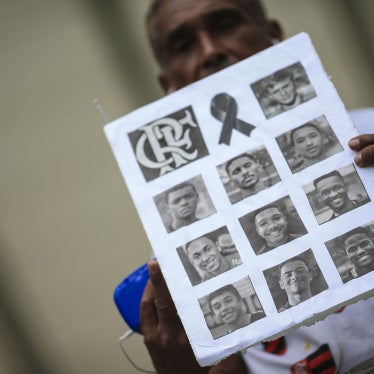(Santafé de Bogotá, September 18, 2003) -- More than 11,000 children fight in Colombia's armed conflict, one of the highest totals in the world, Human Rights Watch said in a new report released today. Both guerrilla and paramilitary forces rely on child combatants, who have committed atrocities and are even made to execute other children who try to desert.
The first comprehensive report published on this issue, "You'll Learn Not to Cry: Child Combatants in Colombia," documents how Colombia's illegal armies have recruited increasing numbers of children in recent years. Only Burma (Myanmar) and the Democratic Republic of Congo are believed to have significantly larger numbers of child combatants than Colombia.
"By relying on children to fight, guerrillas and paramilitaries are doing incalculable damage to Colombian society," said José Miguel Vivanco, executive director of the Americas Division of Human Rights Watch. "These children will bear the scars of their experience for decades to come."
Eighty percent of the children under arms belong to one of the two guerrilla groups, the Revolutionary Armed Forces of Colombia (FARC) or the National Liberation Army (ELN). At least one of every four irregular combatants in Colombia is under eighteen years of age. Of these, several thousand are under the age of fifteen, the minimum age permitted for recruitment under the Geneva Conventions.
"Sending any child under eighteen to fight and be killed is reprehensible, and the use of child combatants under fifteen is a war crime," said Vivanco. "Under no circumstances should the government offer guerrillas or paramilitaries immunity from prosecution for this heinous conduct."
The 150-page book, based on interviews with 112 former child combatants, documents how both guerrillas and paramilitaries exploit the desperation of poor children in rural combat zones. Many join up for food or physical protection, to escape domestic violence, or because of promises of money. Some are coerced to join at gunpoint, or join out of fear. Others are street children with nowhere to go. Children as young as thirteen are trained to use assault rifles, grenades and mortars. Some are even younger.
Bernardo, a boy who was conscripted into a paramilitary group, told Human Rights Watch how children are trained to be killers. "They teach you bit by bit, first with a .38 [handgun] and then with a bigger weapon," Bernardo said. "I was shooting at posts with an AK-47 before I was eight."
Youngsters in paramilitary groups told Human Rights Watch that their training included watching prisoners being mutilated with knives or chainsaws. "They'd kill three or four people each day in the [training] course. Different squads would take turns, would have to do it on different days," said Óscar, a former paramilitary.
More than a quarter of the children interviewed Human Rights Watch are girls, most of them from the FARC. They told us that many male commanders use their power to form sexual liaisons with underage girls. Girls as young as twelve are required to use contraception, and must have abortions if they become pregnant.
On both sides, children who try to escape and return to their families risk execution. Guerrilla "war councils" vote by a show of hands whether erring combatants should be put to death. In some cases, both victims and executioners are children. "You have to do it because it's an order," said Elizabeth, a young fighter in the FARC. "There had been a war council and I had voted no. The commander told me, 'Since you voted no, you will be the one to kill him.'"
Colombian armed forces and police do not recruit children under eighteen, and the recruitment of minors is punishable by six to ten years in prison. Yet the government has failed to protect children by enforcing the law energetically.
"The Colombian government should make the demobilization of children from guerrilla and paramilitary forces, and an end to their further recruitment, a priority item in any future negotiations with these forces," said Vivanco.
Human Rights Watch urged guerrilla and paramilitary forces to end all recruitment of children under the age of eighteen and to demobilize the children in their ranks. Pending complete demobilization, the group urged the following immediate and unconditional steps: firmly prohibit forcible recruitment; allow those who wish to leave without reprisals; cease executions of children; and provide proper medical care for the sick or wounded. The United States should urge that the demobilization of children be made a top priority in future negotiations with paramilitaries and guerrillas, Human Rights Watch said.








